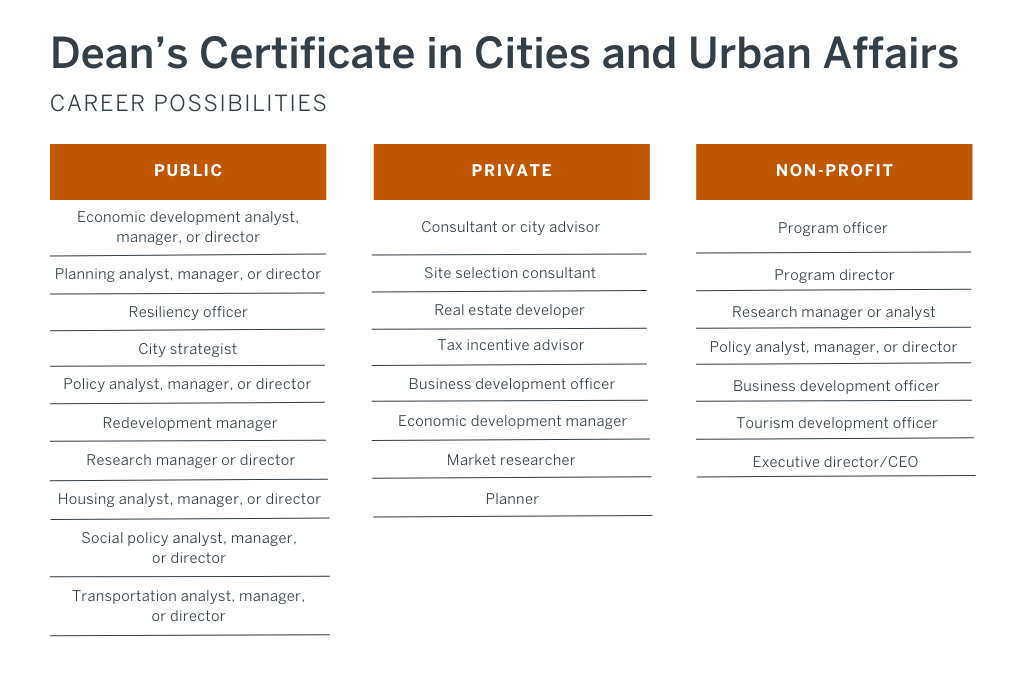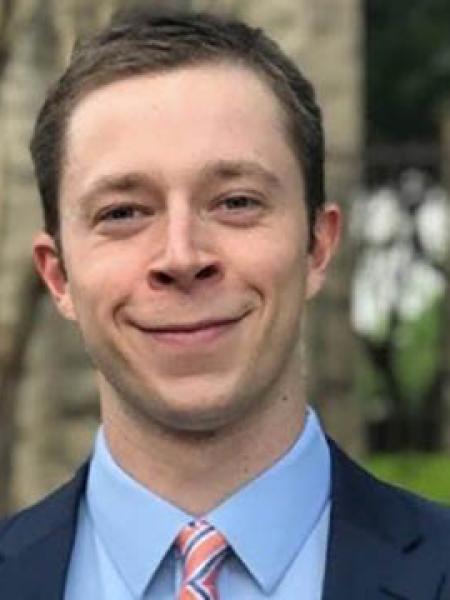The LBJ School Dean's Certificates program, launched during the 2019–20 academic year, gives students an opportunity to earn an additional credential by exploring in-depth policy areas that are increasingly critical in the public affairs arena. The program combines academic knowledge, analytical skills and practical application to help give students a leg up. We offer certificates in Data Science and Policy Analysis and Cities and Urban Affairs for the MGPS.
NEW! The Dean's Certificate in Cities and Urban Affairs launched in March 2023
Dean's Certificate in Data Science and Policy Analysis
The recent explosion of "Big Data" has led to a rapidly expanding market for graduate degree holders with data analysis and modeling skills, not only in the private sector, but also in government organizations and nonprofits. Many LBJ students are interested in options that allow them to acquire these new analytical skills at the LBJ School, in a format that will provide them with a clear pathway into these new jobs. The Dean's Certificate in Data Science and Policy Analysis is an exciting new opportunity that assists our graduates in finding great employment opportunities after graduation.
The DSPA Certificate has a unique, innovative structure designed to certify acquisition of a particular set of data science skills and demonstrate to prospective employers that the certificate recipient can apply those skills in defining, organizing and executing an original data science project. It does not require completion of a particular fixed selection of courses. Selection of the three approved courses in which those skills can be acquired is flexible by design, and can utilize both qualifying sections of advanced methods classes or qualifying sections of policy-oriented classes with an empirical analysis project component. Recipients of the LBJ DSPA certificate must also complete an original, individual data science project demonstrating proficiency in all required skills.
A total of three approved courses must be completed which, collectively, demonstrate competence in the following five skills:
- Use of a modern data science software platform for empirical data analysis
- Demonstrated knowledge of current methods of acquiring, merging and cleaning multiple sources of unprocessed digital data; knowledge and use of principled methods to deal with missing, miscoded and outlier data
- Ability to create compelling and effective summaries and visualizations of large-scale data sets;
- Demonstrated proficiency in application of statistical models or machine learning methods to the analysis of empirical data sets using software tools
- Successful completion of an original, individual policy analysis project using statistical and data science tools applied to a real-world empirical dataset, demonstrating proficiency in all the above skills
More:
Dean's Certificate in Cities and Urban Affairs
Cities are our research and innovation hubs, centers of creativity and competitiveness, and where we come together to live, work, and build connections. By 2050, more than 75 percent of the world’s population will be city dwellers. The largest 100 cities already account for two-thirds of global economic output. The great metropolitan areas of the United States – the interconnected regions of urban cores, suburbs, and smaller outlying towns – account for 90 percent of the nation’s economic output.
Texas will grow by 40 percent in the next 30 years, topping more than 48 million residents. Our state already boasts an economy that is larger than Australia’s and is home to five of America’s 15 largest cities – Houston, San Antonio, Dallas, Austin, and Fort Worth – as well as six of the U.S.’s 15 fastest-growing cities of any size.
And in the face of the COVID-19 pandemic, calls for racial justice, and growing equity divides, communities from all corners of the country are reexamining the resiliency of their local economies and the impact of their urban policies. For many places, recent events have revealed needs that can no longer be deferred: affordable housing, wealth creation, mobility, education, workforce development and more. Cities are evaluating old growth models and urban policies, acknowledging what did not work, and looking for new ways to improve city performance and build more inclusive, prosperous communities. Simply put, we are living in an era of city and community building and reimaging; more than ever before, cities are the organizing units of our time.
Learning Objectives
The Dean’s Certificate in Cities and Urban Affairs will offer LBJ students the applied skills, expertise, and insights they need to implement urban policy initiatives.
It will present a selection of courses that will teach students how to analyze urban policies, programs and projects across sectors and interconnected issues.
By completing this certificate program, all students will be able to:
- Describe the relationship and interactions among land use, economic development policies, housing, infrastructure/ transportation, education, and more.
- Catalog the critical assets and public policies that make a city a viable place for enterprise formation and growth.
- Describe and guide policy given the unique social, economic and political challenges of cities including those related to governance, infrastructure, public health, public safety, social cohesion and cultural advancement.
- Develop a framework for evaluating community competitive advantages and the effectiveness of economic development tools, such as incentives, policies, grant programs, and partnerships.
- Establish a strong foundation of urban management competency and skills.
- Create an urban management approach that balances the role of a manager between politics and policy implementation.
Career Possibilities
Approximately 65,000 professionals in the U.S. comprise the three largest associations associated with the practice of city building and urban policy: International Economic Development Association (IEDC), International City/County Management Association (ICMA), and Urban Land Institute. LBJ students who complete this certificate will become highly marketable urban policy professionals with opportunities that span the public, private, and nonprofit sectors.

Course Requirements
The Dean’s Certificate in Cities and Urban Affairs requires successful completion of five three-credit courses: three required and two electives.
Required Coursework
Students will complete three foundational courses: one in urban economics and policy, another in economic development and planning, and a final in urban politics and governance.
A student wishing to fulfill the certificate requirements need only take one course from each of the three areas below. Two courses are listed in each area so that a student can complete either in fulfillment of the requirement.
Urban Economics and Policy
Cities and regions are the fundamental building blocks of today’s economy. These courses will provide students with the knowledge and understanding of the fundamentals of urban economies: land use, economic development policies, housing and more.
- PA 393L: Advanced Policy Economics: Urban Economics and Policy, OR
- CRP 385C: Urban and Regional Theory
Economic Development and Planning
Today’s city leaders face complex and connected economic, social, and environmental challenges. These courses will offer students a framework for engaging communities on system-focused urban strategy initiatives and economic development planning.
- PA 388K: Advanced Topics in Public Policy: Urban Economic Development
- PA 388K: Advanced Topics in Public Policy: Sustainable Urban Economic Development Planning
Urban Politics and Governance
Urban affairs and management requires an understanding of the role of elected leaders, how they are elected, their duties, and how they work with other levels of government. The goal of this requirement is to help students understand how elected officials and managers govern in cities
- PA 388L: Advanced Topics in Management: Urban Management, OR
- PA 384F: Advanced Public Management: Collaborative Governance
Elective Coursework
In addition to the foundational courses, students will select two elective courses from the following list, spanning the topics of transportation, civic engagement, public finance, education, housing, natural resources and more:
- PA 388K: Policy Development: Transportation Policy Development
- PA 388K: Policy Development: Urban Policy
- PA 393L: Advanced Policy Economics: Economics of U.S. Person-Based Anti-Poverty Policy
- PA 391F: Advanced Public Financial Management: Financing the State and Local Government Sector
- PA 388K: Advanced Topics in Public Policy: City Consulting
- PA 384F: Advanced Topics in Management: Mobilizing Community and Engaging Volunteers
- PA 391F: Advanced Financial Management: Economic Development Finance
- PA 384F: Advanced Public Management: Sustainability Science, Policy, and Governance
- PA 680PA: Policy Research Project* (Client/ project should tackle an urban policy issue)
- CRP 384-09/ PA 388K: Transportation Planning and Policy
- CRP 384: Transportation Equity Analysis
- CRP 384-1: Urban Transportation Planning
- CRP 383: Environment and Natural Resources
- CRP 384: Planning for Disaster and Resilient Cities
- CRP 387C: Infrastructure Planning
- CRP 388: Housing
- CRP 386-9: Sustainable Land Use Planning
- CRP 388/ SW 395K: Affordable Housing Planning
- CRP 389C: Land Use and Land Development
- CE 389S: Smart Buildings and Cities
- CE 391J: Transportation Planning: Methodology and Techniques
- CE 392T: Transport Economics
- SOC 394N: Seminars in Crime, Law and Deviance
- SOC 396P: Seminars in Political Sociology, Development and Globalization (Topic 13- Housing Practices and Public Policy in Latin America, & Topic 16- Urbanization)
- ELP 384F: Foundations of Educational Policy
- ELP 384J: Policy Analysis in Education
- ELP 384R: School, Family and Community Engagement
- ELP 384V: Poverty and Education Policy
- ELP 390P: Educational Politics and Policy
Substitute Elective Courses:
With the support of a faculty member, a student may propose a substitute ‘elective’ class, if the student will be graded at 40% or more on materials that address municipal, metropolitan, or regional economics, governance, planning or management topics. The faculty member will submit a syllabus to the faculty coordinator. Any decision on substitution as an elective class will reflect the course content and student expectations.
Certificate Governance
The MPAff GSC must approve the creation of the certificate. Annually, the certificate coordinator will approve course additions to the course requirements, including eligible electives. Professor of Practice Steven Pedigo will serve as the inaugural certificate coordinator. Annually, the Associate Dean for Academics will appoint a certificate coordinator.
Contact
Steven Pedigo, LBJ School Professor of Practice and Director of the LBJ Urban Lab

Feedback on the Dean's Certificates
Taylor Lewis (MPAff '20), was one of the first students to earn a Dean's Certificate. He called it "the best decision I made as an LBJ student."
"The program's curriculum gave me broad exposure to the fundamentals of public finance while also allowing me to hone my knowledge in the more specialized areas of governmental accounting, financial statement analysis, and the municipal securities industry," he said.
Register for an information session.

